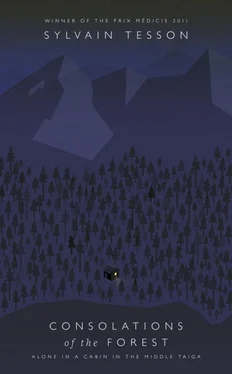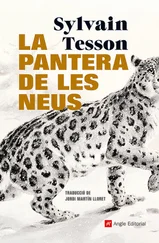Midnight; I stroll out on the lake. How can I recover the impression I had when I first arrived on these gleaming coal-grey shores seven years ago? My soul was laid wide open with happiness. Where is the enjoyment of this place that kept me awake those first few nights on the beach? The comfort of my cabin is dulling my perceptions. Too much ease coats the soul with soot. I’ve been here just a few weeks and already I feel like a local. Soon I’ll know every evergreen as well as I know the bistros of my Parisian stomping grounds. Being at home somewhere is the beginning of the end.
A hundred paces from my cabin, the toilet: a hole in the ground in an open shed cobbled together from planks. Going out there tonight, I remember ‘The Apple Tree’, a short story by Daphne du Maurier: a man meets his downfall one freezing night, tripping over the roots of his long-suffering wife’s favourite tree, vengefully cut down by the widower after her death. I imagine myself falling somewhere along the way in −30º. I would die there, about fifty yards from the cabin, with its string of smoke rising from the roof, and the explosions of the lake ice for a eulogy. Ceasing to struggle, I would slowly rejoin the beautiful silence while thinking: No, really, this is too dumb . Oh, those people who’ve got lost and died a few yards from shelter…
Help is there, a mere ten steps away, but the threshold of safety remains out of reach. Kurosawa made a movie about that: a group of mountaineers, freezing in a blizzard some seventy yards from camp. And Scott of the Antarctic! Have we forgotten his agony, not even twelve miles from a supply depot? Out in the Taklamakan Desert of north-west China, where ancient mummies of Caucasoid peoples have been discovered in the Tarim Basin, the explorer Sven Hedin had the opposite adventure: believing himself lost, he prepared to die – and stumbled onto an oasis.
2 MARCH
Almost half a mile to the south of the cabin, a granite rise cleaves the forest. Looming 300 feet into the air, the rise dominates the lake; six larches crown the summit, giving it the shape of a pine cone. Lynx tracks mottle the slope leading to the foot of the dome. I toil my way up there; powdery snow covers the scree. I sink in up to my thighs and sometimes lose a foot down a gap between two rocks. From the summit, Baikal: a plain striped with ivory veins. The silence of the forest envelops the world and the echo of this silence is millions of years old. I’ll be coming back here. The ‘pine cone’ will be my crow’s nest for the days when I need a lofty view.
Sasha and Yura, the fishermen I met at Sergei’s two weeks ago, drop in for a visit. I pour the ritual glasses. In this life, sharing a glass with a companion, feeling safe in the warmth of a shelter – this is already something. The stove is drawing well and the atmosphere makes us drowsy. A soft weight falls upon our brows, a sign of biological well-being. The vodka goes down. The spirit is buoyed, the body contented. The air fills with tobacco smoke as conversation dies away. I always find peace in the company of Russian woodsmen: I feel theirs is the human environment in which I would have liked to be born. It’s good not to have to keep a conversation going. Why is life with others so hard? Because you must always find something to say. I think of those days of walking around Paris nervously tossing off ‘Just-fine-thank-yous’ and ‘Let’s-get-together-soons’ to strange people I don’t know who babble the same things to me, as if in a panic.
‘Cold?’ asks Sasha after a moment.
‘S’okay,’ I say.
‘Snow?’
‘Plenty!’
‘Visitors?’
‘Day before yesterday.’
‘Sergei?’
‘No, Yura Uzov.’
‘Ah, that Yura…’
‘Yes, that’s the one.’
There are dialogues like this in Jean Giono’s The Song of the World . At the beginning of the novel, the riverman, Antonio, addresses the forester, Matelot:
‘That’s life,’ said Antonio.
‘S’better, the forest,’ said Matelot.
‘Each to his own,’ said Antonio.
‘The less you talk, the longer you live,’ says Yura. I don’t know why but I suddenly think of a certain garrulous French politician. Must tell him he’s in danger.
Sasha leaves me a five-litre keg of beer. In the evening I slowly dispatch two of those litres. Beer or the local dive, the alcohol of the poor. Beer is a sedative that anaesthetizes thought and dissolves all spirit of revolt. With the beer hose, totalitarian states extinguish all of society’s fires. Nietzsche loathed this piss-juice because it fostered ‘the spirit of heaviness’.
With a stick in the snow: The world, for which we are in turn the brush or the brushstroke.
3 MARCH
I remember my walking trips in the Himalayas, travelling on horseback in the Celestial Mountains, biking three years ago on the Ustyurt Plateau of Central Asia… That joy, then, at conquering a mountain pass. The carnivorous hunger to cover the miles. The longing to press on even if it kills you. At times I advanced as if possessed, walking into exhaustion, delirium. In the Gobi, I would stop to spend the night right there , crumpling where I stood, and set out again the next day automatically, the moment I opened my eyes. I was aping a wolf; now I’m being a bear. I want to dig in, become the earth after having been the wind. I was obsessively bound to movement, drugged with space. I was chasing after time, believing it was hiding just over the horizon. ‘The vigorous use of time may offset its fast pace’ (Montaigne, Essays , vol. 3), and that’s how I dealt with its swift passage.
A free man possesses time. A man who dominates space is merely powerful. In cities, the minutes, hours and years are the flowing blood of wounded time, and they escape us. In the cabin, time grows calm. It lies at your feet like a good old dog and suddenly, you’ve even forgotten it’s there. I am free because my days are.
As I do each morning while the stove is heating up, I go down to the water hole thirty yards out from the shore. The opening freezes over during the night and must be chopped free again. I stand there a moment, gazing at the taiga. Out of the hole flashes a white hand that grabs my ankle in a blinding hallucination – these waters have swallowed so many drowned bodies! – and I recoil, dropping the ice axe. My heart is racing. Sleeping waters are wicked: lakes exhale a melancholy atmosphere because spirits prowl there bottled up, brooding on their grief. Lakes are burial vaults, where silt gives off a noxious odour and vegetation clumps in dark reflections. Out at sea, the currents, salt and ultraviolet light dissolve all mystery in limpid waters.
What happened in this bay? Was there a shipwreck, or some settling of scores? I have no intention of cohabiting for six months with a soul in torment. I’ve got my hands full with my own. Lugging my two buckets, I return to the warmth of the cabin; through the window, the water hole makes a black stain on the pale ice sheet, a dangerous spy-hole between two worlds.
Every afternoon I put on my snowshoes. After a ninety-minute tramp into the trees, I reach the upper skirt of the forest.
I like entering the woods. Sounds soon fade away. When I step inside a Gothic cathedral in France or Belgium, I feel the same soothing calm, a sweetness of being that diffuses its warmth behind the brow and makes eyelids heavy. Something in me reacts to the glow of both limestone and conifers. At present, I prefer old-growth forests to the stone naves of churches.
Beneath the trees, forever sheltered from the wind, the snow lies thick. I sink deeply into it in spite of my snowshoes. Lynxes, wolves, minks and foxes roam at night. The tracks tell stories of tragedy in the wild. Some are beaded with blood; they are the words of the forest. The animals tread lightly on their paws in proportion to their weight, whereas man is too heavy to walk atop snow. Now and then, the cries of jays; otherwise, silence. They call from the crowns of firs, feathered sentinels on needle-thin towers. They call because I have invaded their home. No one ever asks animals permission to cross their domain.
Читать дальше












